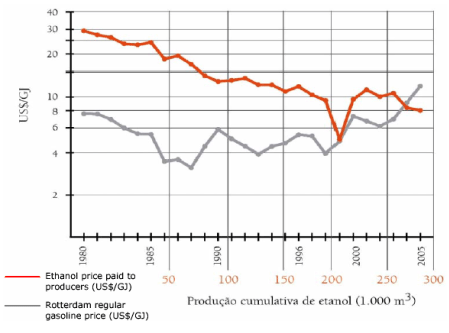Can we go “flat out” on ethanol? This is the issue at the heart of current debate over the viability of ethanol and biofuels as potential substitutes for at least a part dwindling of our petrol supplies. So let me look at the issues, as an observer without vested interests.
On the positive side, the experience of Brazil demonstrates unequivocally that ethanol can be produced more cheaply than the current cheapest oil - without subsidies. There has been a belated recognition of Brazil’s success now being registered in the international press.

Source: UNICA
Advertisement
Not all countries can produce ethanol from sugar cane as cheaply as Brazil. But many are close - including Australia, India and many of the tropical countries in Africa. For the latter, a little dose of technological assistance from the developed world would create an “ethanol zone” covering Brazil and Central America, India and South-East Asia and Africa, that is every bit as productive of liquid fuel as the Middle East is productive of oil today.
The difference, of course, is that growing sugarcane and producing ethanol in these countries would kick start their development efforts; free them from dependence on oil imports and the accompanying financial burdens; underpin their energy security; and drive their rural development efforts, thus bringing them out of poverty and guiding them, peacefully, towards democratisation.
Compare this with the high price of oil, and oil dependence, propping up unsavoury oil regimes throughout the Middle East, where the regime buys off popular discontent or makes war on dissidents (as in Nigeria) but never seems to get around to the job of industrial development.
I’ll come back to some more positives in a moment. But what about the negatives? Most of the counter-arguments come from the US, where ethanol is produced in a temperate climate largely from corn and grains. The counter-argument is that intensive agricultural practices utilised in the US corn belt produce ethanol that requires heavy energy inputs in the form of fertilisers, herbicides, and transportation. Some estimates (pdf 114KB) (note that this widely cited study does not even consider ethanol from sugar cane) put the net energy produced as zero or something very small.
But Brazil produces ethanol with an energy gain of up to 8:1, because of the favourable conditions in which the fuel is produced. Add to this the fact that Brazil has spent years perfecting suitable varieties of cane and even genetically engineering it to optimise yields.
Now I have no brief for the US corn belt, and I am opposed to the use of intensive agriculture that exhausts soils and produces unacceptable runoff as anyone else. But do these arguments carry across to the use of sugar cane in tropical countries?
Advertisement
Taking them in reverse order, transport is minimised when ethanol plants are built next to the sugar cane fields, as is always the case in tropical countries. Herbicides are not needed in cane fields - you don’t do any weeding for such a crop, and in fact any weeds that manage to grow are simply swept up as “biomass” to go the sugar/ethanol mill. Fertiliser inputs are minimised by recycling the waste from ethanol distillation (vinasse) after drying it. And the drying, as well as the entire operation of the mill, can be powered by a mini-power plant burning the cane stalks after extracting the juice.
So if Australia were to swing behind sugar cane for ethanol production in a big way, then the results would be almost entirely positive. Farmer co-ops would be formed to build the ethanol plants, and they would provide steady employment in rural areas. The supplies of ethanol would encourage independent retailers of fuel to challenge the near-total dominance of the oil majors over distribution of petrol and fuel oils.
The political situation in Australia is so toxic that debate is railroaded by an alleged cosy deal between John Howard and Manildra boss, John Honan, over blocking a tanker of ethanol from Brazil to Australia. But it’s time to move on from such pettiness to look at the bigger picture. An ethanol industry in Australia would dwarf Manildra.
Discuss in our Forums
See what other readers are saying about this article!
Click here to read & post comments.
22 posts so far.